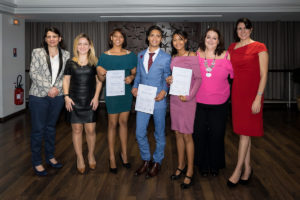Each year the GTTP holds a competition for the best school research project on a given topic. For 2022, GTTP Country Directors have chosen the theme of Responsible Tourism Post Covid.
Here are this year’s guidelines and some sources to kick start your research.
National Competition
Students are asked to work in teams to consider how their communities have embraced the new dawn of responsible tourism and come up with imaginative ways to engage with visitors post Covid, reshaping the tourism landscape as a result.
Teams submit their entries to their national competition. Each GTTP member country determines how it will organize its national competition, what is required to enter, and when the entries must be submitted.
All questions on entering your national competition should be directed to the GTTP Director in your country.
International Conference

Teams meet for four days. Global Partners provide hotel rooms and some meals. Any additional expenses need to be covered by participants.
Participants have an opportunity to meet GTTP Global Partner Advisory Board Members, take part in a treasure hunt, go sightseeing, and meet GTTP students and teachers from around the world.
The overall country winners will be decided by September 30, 2022, to allow for visa applications and travel arrangements to be made.
Preparing for the International Conference Presentation
Winning teams should prepare a written case study of their project, which will be published on the GTTP website for use by GTTP teachers and students around the globe. Please click on this link to find out more about what makes a good case study.
If teams are using a technology based application for the in-person presentation, that presentation must be forwarded to GTTP Country Director prior to the team travelling to the UK to ensure that it can be accessed by our technology platform. Exact requirements will be provided by the GTTP Director in each country.
NOTE TO STUDENTS: Do not borrow images from the internet unless the website states clearly that you may use the images. Taking images without permission is called “copyright infringement” and can result in expensive financial penalties. GTTP will remove images from case studies if it believes there may be a copyright problem.
Responsible Tourism
Responsible Tourism is about making better places for people to live in and better places for people to visit. Responsible Tourism requires that operators, hoteliers, governments, local people and tourists take responsibility and act together to make tourism more sustainable.
Responsible Tourism takes many forms, and different destinations and stakeholders will have different priorities. The characteristics of Responsible Tourism can include:
- Minimising negative economic, environmental, and social impacts.
- Generating greater economic benefits for local people and enhancing the well-being of host communities, improving working conditions and access to the industry.
- Involving local people in decisions that affect their lives and life chances.
- Making a positive contribution to the conservation and regeneration of natural and cultural heritage, to the maintenance and restoration of the world’s diversity.
- Providing enjoyable experiences for tourists through more meaningful connections with local people, and a greater understanding of local cultural, social and environmental issues
- Providing access for people with disabilities.
- Promoting cultural sensitivity, engendering respect between tourists and hosts, and building local pride and confidence.
Your case study should focus on finding out what “Responsible Tourism” means in your local area or country, especially in the light of the global pandemic. It should assess what is working well, what might need improving, and what the impact of responsible tourism is.
Initial Information Sources
- The World Travel and Tourism Council (WTTC) is probably the single largest source of reports on the economic and social impact of the industry. It publishes 24 regional reports, 184 country reports as well as a global report. It also publishes important reports on major issues that affect the industry and organizes conferences.
- Skift means “shift” or “transformation” in the three Nordic languages. This online publication’s mission is to be “the daily homepage of the global travel industry.” It offers news, research and opinion, specialist newsletters, and organizes industry-related conferences.
- PhocusWire is a comprehensive daily news companion for the industry, powered by Phocuswright, a respected travel research authority and events brand. It provides sought-after research, valuable industry data and expert analysis.
- GTTP Global Partners’ websites and social media provide details on the actions they are taking around Responsible Tourism.
- https://www.unwto.org/responsible-tourist,